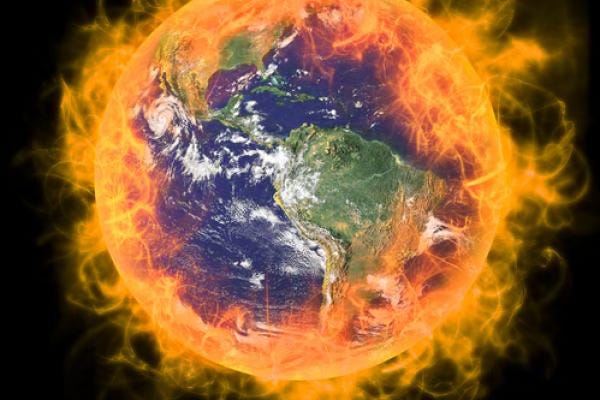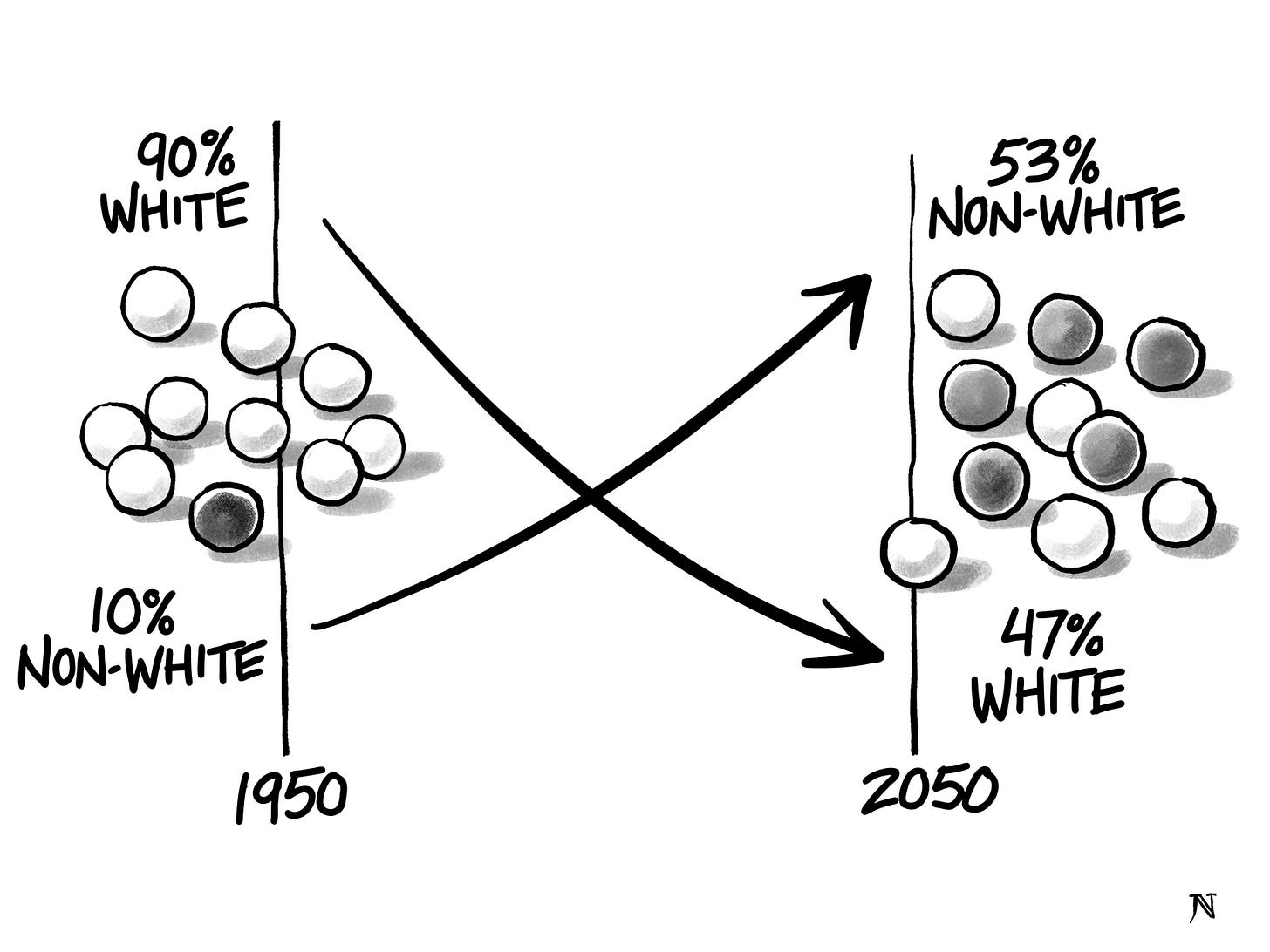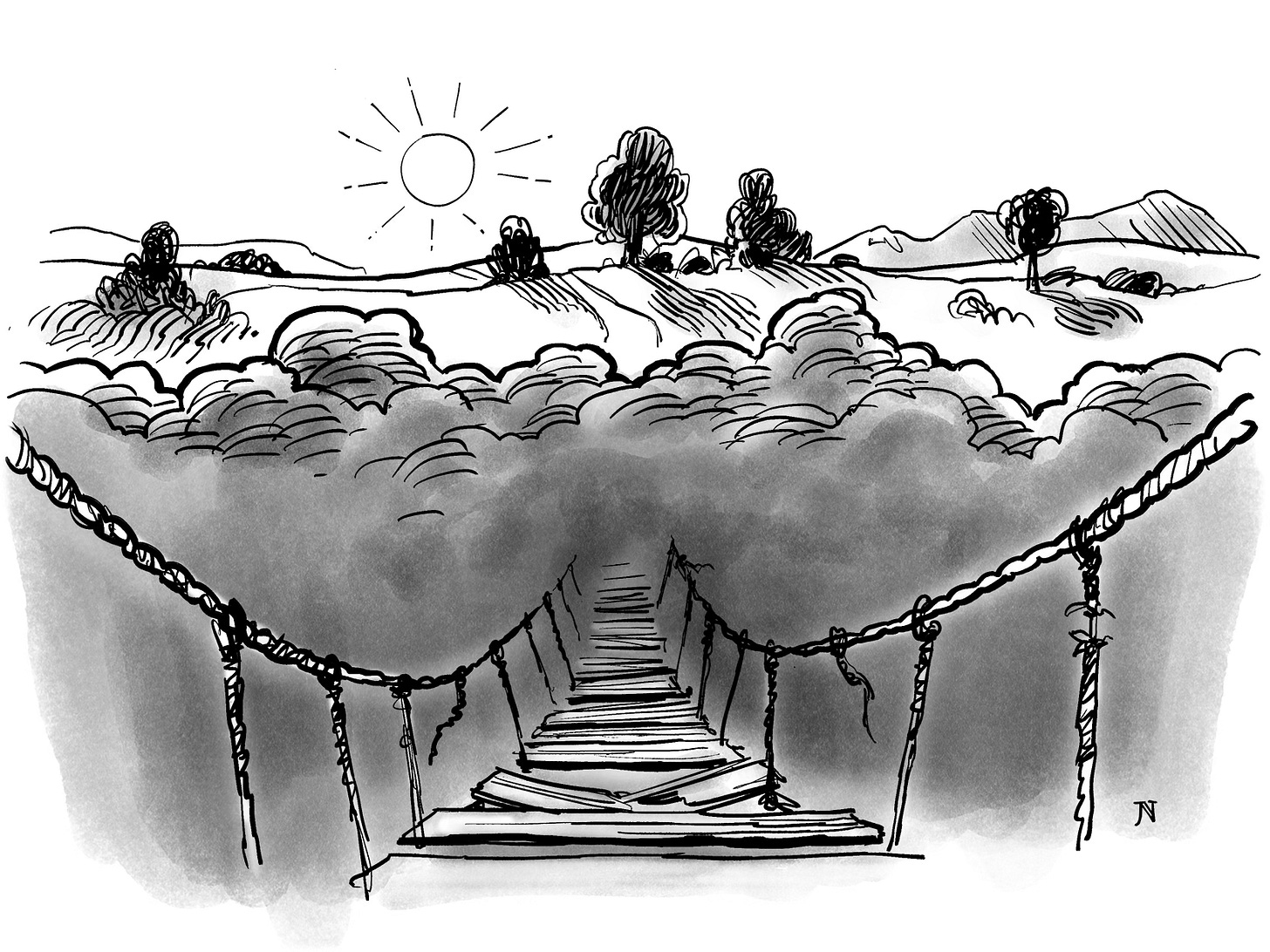"The World is on Fire"
Nikki Haley and the universe of catastrophists on the Right
Donald Trump’s ascent didn’t just tap into the populist anger of a troubled middle class. He turbocharged a White Christian Nationalism with its signature “end times” rhetoric about an American (read, White Christian) civilization going straight to hell.
A recent NYT story on the academics and public intellectuals pushing this catastrophism view of human history spells it out nicely:
A coalition of intellectual catastrophists on the American right is trying to convince people of just that [that democracy is a luxury we can no longer afford] — giving the next generation of Republican officeholders, senior advisers, judges and appointees explicit permission and encouragement to believe that the country is on the verge of collapse. Some catastrophists take it a step further and suggest that officials might contemplate overthrowing liberal democracy in favor of revolutionary regime change or even imposing a right-wing dictatorship on the country.
The more extreme version tinges it all with religion, of course:
Those on the right primarily concerned about the fate of traditionalist Christian morals and worship in the United States insist that we already live in a regime that oppresses and brutalizes religious believers and conservatives. And they make those charges in a theologically inflected idiom that’s meant to address and amplify the right’s intense worries about persecution by progressives.
Among the most extreme catastrophists writing in this vein is Stephen Wolfe, whose book “The Case for Christian Nationalism” calls for a “just revolution” against America’s “gynocracy” (rule by women) that emasculates men, persuading them to affirm “feminine virtues, such as empathy, fairness and equality.” In its place, Mr. Wolfe proposes the installation of a “Christian prince,” or a form of “theocratic Caesarism.”
Taken on its surface, one gets the feeling that the only “true” way forward is the demotion and re-traditionalization of women throughout public life, the closeting of all “aberrant” sexual behavior and identities, outlawing of abortion, re-elevation of religious principles and laws throughout the land, etc. — essentially a sort of American Taliban rule, or something akin to radical Salafi jihadism. In other words, we survive this world of chaos by retreating deep into our socio-economic past, accepting that democracy cannot survive this turning back of our cultural clock.
Pretty wild stuff until you realize the new Speaker of the House falls into this category and our Catholic-dominated Supreme Court is pushing hard to eradicate the line between church and state.
There are so many reasons and methods for pushing back on this worldview. I want to highlight two basic ones here.
First, there is the demographic journey upon which we now travel, one that plunges us into unknown territory. Here is how I described it in America’s New Map:
American documentarian Ken Burns notes that “race is at the core of the American story.” Until recently, that story was told in a one-sided fashion befitting a country populated overwhelmingly by Whites. America was 81 percent White in our first national census (1790) and that share crept steadily upward until peaking at 90 percent at the middle of the twentieth century.
As America began exporting its model of globalization-through- integration following World War II, the White share of its population began its slow decline to just under 60 percent. What had been a pre–World War II immigrant flow dominated by Europeans eventually morphed into one dominated by Latinos and Asians. In 2050, Whites will comprise 47 percent of our population—just over half that 1950 high point. That steep demographic journey is unprecedented among the world’s great powers. It has never been attempted—much less self-engineered.
As globalization’s pioneering force, America must not only survive this demographic transition but also demonstrate how a predominantly multiracial union can thrive across its unfolding. Doing so will not only restore but define America’s global leadership this century by providing the biggest, boldest answer to the greatest political challenge ever faced by humanity.
Much like at the end of World War II, America stands at the precipice of a new historical age forced upon humanity by the climate change phenomenon triggered by our decision then to propagate a new world order based on the same principles of integration that made us the most powerful economic force on the planet — ultimately triggering and defining a new geological age (Anthropocene).
The world, having suffered two world wars in short order, was on the verge of collapse. But America and Americans stepped up and engineered a new path forward: radical economic interdependency. Our experiment started with just the Free World but eventually attracted the imitation and emulation of Asia as a whole, begetting the most fabulous period of economic wealth creation and extreme poverty reduction ever known to humanity — the triumph of US-style globalization.
The most obvious price of that world-shaping success, as I always note, is climate change.
But the secondary price is also steep: radical North-South integration (due to climate migration) that will remake Northern societies across this century.
Just like after WWII, when America was so much further along in having the economic integration answer/experience/model, we now face the same challenging opportunity on racial integration.
No nation on this planet features a more synthetic identity than America — a completely made-up country (there is no reason for any of us “replacers” to be here — save the First Nations peoples) that dedicated itself (quite narrowly at first) to the notion of human equality and “self-evident” individual freedoms. We are likewise an immigrant nation that, like the rest of our hemisphere, has been mixing races from all over the world for centuries now — thanks to the original imperial impulses of conquering European colonial empires and later our westward expansion.
So does the great racial makeover experiment noted above surprise me? Not at all. It was, in many ways, preordained by everything that came before it.
So, much like after WWII, America now has the opportunity and responsibility to show how the world can best manage this increasingly inevitably North-South integration. As I note throughout the book, America and Americans are built for this challenge.
You’ll tell me that’s nuts, given our obsession over immigration right now, and I’ll tell you that’s a clear sign of us inherently fearing and dreading the future we know deep down is inevitably arriving.
At this point in history, we either embrace this follow-on challenge of our own making or we retreat into ethno-religious-cultural isolation — the Taliban choice of checking out from human progress. That is what these catastrophists seek to engineer and that is what White Christian Nationalism — at its core — dutifully accepts as a necessary path to cultural self-preservation.
None of that works for me. I really do love and totally believe in our country and its unique impact on world history. I believe that being an American is the most important identity any of us will ever have — more important than race, religion, gender, or sexual orientation. That’s because how we choose to act shapes world history far more than any other nation. That’s just who we are.
That’s the bigger load off my chest.
The simpler one is this notion pushed by Nikki Haley that our “world is on fire,” which is complete nonsense. We have one serious superpower-on-non-superpower war that, quite frankly, dates back to 2014 (Russia-v-Ukraine) and other civil conflict that goes back to 1948 (Israel-v-Palestinians). Beyond that we have about 30 states presently suffering some form of civil strife, usually dealing with an insurgency. Virtually all stretch back years or even decades in their longevity. As a total load of world-spanning violence, it is neither high nor unprecedented and a bit of a drop in recent years, by my calculations.
This notion of a “world on fire” is catastrophism by choice. Haley sells it as a way to attack Biden and to set her apart from the erratic nature of Trump’s foreign policy record. I get that. Of the Republicans, I would take her first and foremost, particularly because she seems reasonably sensible on foreign policy.
But fear is not an acceptable sale, in my opinion. It motivates near-term reactions but does not sustain a long-term effort. I realize that I may well be in the minority on that notion, but, if you have to scare people into your vision, it won’t fly for long. They need to see the happy ending on the far side of the struggle — that being a primary reason I wanted to write America’s New Map.
People need something to get them out of bed in the morning — not to make them pull the sheets over their faces and wish that today would go away. Our political parties are mostly lost in selling fear: the Dems sell the fear of Trump’s return and the triumph of White Christian Nationalism (which certainly has me worried), and the Republicans sell the end of the world — which I find ridiculous.
Our younger generations see nothing good in these sales, only a backward-ism that discounts their primary fears, which center more and more on climate change.
We need a positive sale here and we’re not getting one. There isn’t sufficient reason for all this doom-and-gloom. Truly, we’re acting like children compared to the Greatest Generation’s embrace of the challenges they met and overcame.
But here’s the good news: that sort of childish behavior is largely concentrated in the Cold War baby ranks (Boomers, GenXs). I have dramatically higher hopes for the oncoming Millennials and GenZs, whose heads and hearts are in the right place.
If only their elders would get out of the way and let a JFK-like candidate step up and reinvigorate our self-confidence, self-worth, and inner motivation to engage the future with genuine ambition.





Not without merit, but then there’s this parenthetical: “there is no reason for any of us “replacers” to be here — save the First Nations peoples.” 🤷🏻♂️
Exceedingly insightful. One of the big gaps in our democracy is the lack of a shared strategic sensibility. George Washington was arguing wholeheartedly for this in his Farewell Address. He learned on his way to becoming President why he needed to stay pre-partisan as President. Someone needs to exemplify a hopeful, engaged posture that wasn’t so engaged in the moment as to lose sight of the big picture. I believe in the kids too.